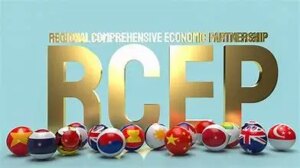Navigating the Shifting Dynamics of Global Trade: The Rise of RCEP and the Future of Consumerism

As economic tensions rise globally, particularly with the U.S., countries like China, Japan, and South Korea are seizing the opportunity to strengthen their economic ties. This strategic pivot comes at a time when tariff concerns are at an all-time high, prompting these nations to seek new avenues for trade. In a recent landmark meeting, the three nations engaged in trade discussions for the first time in half a decade, signaling a potential shift in the balance of global commerce.
The Consumerism Paradigm Shift
Historically, consumerism has been a cornerstone of the U.S. economy, with international markets eager to sell their goods to American citizens. However, changing trade policies and tariffs are compelling nations to find new buyers, and they’re looking beyond American shores. The emergence of the Regional Comprehensive Economic Partnership (RCEP) in 2022—a groundbreaking agreement between 15 Asian nations—aims to dismantle trade barriers and foster economic collaboration. This collaboration covers an impressive 30% of global GDP and represents a staggering 30% of the world’s population, or about 2.2 billion people.
At Extreme Investor Network, we believe that understanding these partnerships is essential for investors looking to navigate the complexities of today’s economic environment. With RCEP in effect, the flow of goods and services among its member nations is expected to accelerate, which could have profound implications for global trade.
A Stalemate or New Beginnings?
Despite its initial promise, RCEP faces challenges. Ongoing geopolitical tensions have momentarily stalled the partnership’s full potential. South Korea’s Trade Minister, Ahn Duk-geun, emphasized the necessity for deepening cooperation and developing frameworks for trade partnerships within the bloc. As these discussions unfold, investors should keep a close eye on how these nations adapt to their changing roles in the global market.
Trade Figures Tell the Tale
Examining America’s trade relationships with these three nations reveals significant insights:
-
China exported $143.5 billion in goods to the U.S. in 2024, a decrease of 2.9% from the previous year. Importantly, the U.S. imported $438.9 billion worth of goods from China, resulting in a substantial trade deficit of $295.4 billion, which has risen by 5.8% year-over-year. Major imports included electrical equipment, machinery, and toys.
-
Japan has shown resilience, exporting $79.7 billion to the U.S., up by 5.4% from the prior year. The U.S. imported $148 billion from Japan, leading to a trade deficit of $68 billion, a decline of 4.3%. Notably, vehicles and machinery were among the top imports.
- South Korea saw an increase in imports to the U.S. to $127.8 billion, a growth of 10.5%. On the flip side, U.S. imports to South Korea were $135.5 billion, resulting in a modest trade deficit of $7.7 billion. Similar to Japan, vehicles played a crucial role in these trade figures.
This complex web of trade dynamics suggests that while dependence on American consumers remains strong, the global market is diversifying as nations seek new buyers and partners.
The Technological Frontier and Future Trends
The recent trade talks have put technology at the forefront. Discussions around semiconductor raw materials indicate a willingness on China’s part to import key components while Japan and South Korea express readiness to supply finished chip products. This collaboration signifies an important step toward a more integrated technological market in Asia and influences global supply chains.
At Extreme Investor Network, we see these developments coinciding with growing signs that America may soon relinquish its title as the financial capital of the world. As countries around the globe begin to favor trade with China, fueled by its expanding middle class, the economic landscape is poised for transformation.
Conclusion: What Lies Ahead
As we look to the future, it’s clear that the dynamics of global trade are shifting. The rise of RCEP and the deepening ties among Asia-Pacific nations indicate a reorganization of economic power. Nations that adapt to these changes and explore new markets will undoubtedly benefit in a rapidly evolving global landscape. Investors who remain informed and agile will find opportunities where others may only see challenges.
Stay ahead of the curve with Extreme Investor Network, where we provide insights that matter and strategies that will empower your investment journey. Join us as we navigate these transformative times together.

